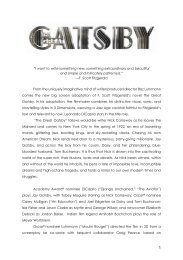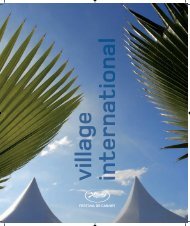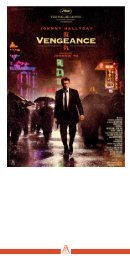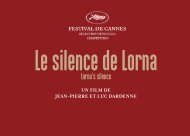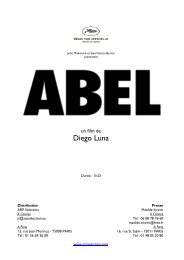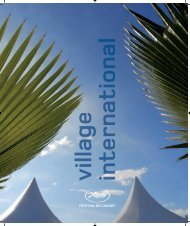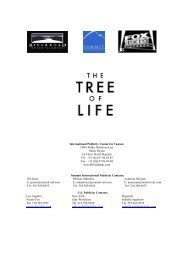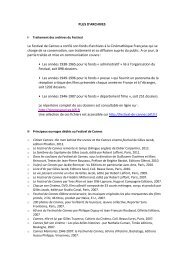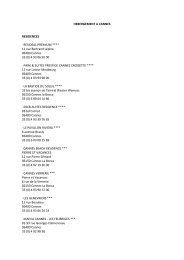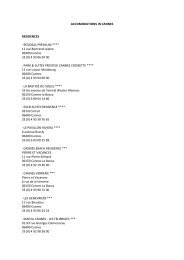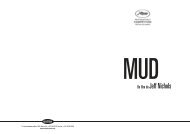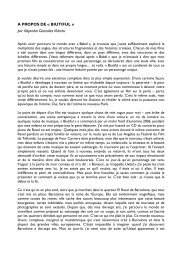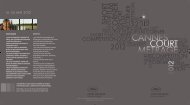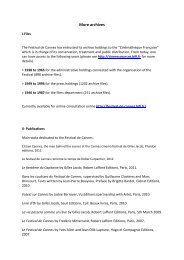Delta - Cannes International Film Festival
Delta - Cannes International Film Festival
Delta - Cannes International Film Festival
Create successful ePaper yourself
Turn your PDF publications into a flip-book with our unique Google optimized e-Paper software.
“I tried to understand the kind of freedom that allows someone to<br />
transcend the norm, rather than talk about sexual deviance. It is not<br />
the incest that is at the heart of the story, but the courage it takes to<br />
accept what is a natural attraction, even if it breaks with conventions.<br />
What is intolerable is that there are people who believe they have the<br />
right to persecute those who do not fit the norm.”<br />
Kornél Mundruczó Director<br />
« Plutôt que d’évoquer frontalement la déviance sexuelle, j’ai voulu<br />
aborder la notion de liberté. Une liberté qui permettrait à un individu de<br />
transcender la norme. L’inceste n’est pas au coeur du récit, il s’agit plutôt<br />
du courage dont il faut faire preuve pour accepter une attirance naturelle<br />
brisant tabous et conventions. L’intolérable, c’est que certaines personnes<br />
croient avoir le droit de persécuter quiconque ne se plie pas à la norme. »
Cast / Distribution<br />
Félix Lajkó<br />
Orsi Tóth<br />
Lili Monori<br />
Sándor Gáspár<br />
Crew / Equipe technique<br />
Editing / Montage : Dávid Jancsó<br />
Sound / Son : Gábor Balázs, Tamás Zányi<br />
Sound Mixer / Mixage son : Gábor Balázs<br />
Music Recording / Enregistrement de la musique : Gábor Balázs<br />
Assistant Cameraman / Assistant caméra :<br />
Gergö Csepregi, István Decsi, Gusztáv Kirsch<br />
Costume / Costumier : János Breckl<br />
Production Designer / Décors : Márton Ágh<br />
Assistant Director / Assistant réalisateur : János György<br />
Director of Photography / Directeur de la photographie : Mátyás Erdély<br />
Producers / Producteurs : Viktória Petrányi,<br />
Susanne Marian, Philippe Bober<br />
Co-producers / Co-producteurs : Ági Pataki, Gábor Kovács<br />
Scriptwriter / Scénario : Yvette Bíró, Kornél Mundruczó<br />
Director / Réalisation : Kornél Mundruczó<br />
Production / Production : Proton Cinema,<br />
Essential <strong>Film</strong>produktion, <strong>Film</strong>partners<br />
With support from / Avec le soutien de :<br />
Motion Picture Public Foundation of Hungary,<br />
National Cultural Fund, Medienboard Berlin-Brandenburg,<br />
Mitteldeutsche Medienförderung, ZDF Daf Kleine Fernsehspiel<br />
/ ARTE, TV2, MEDIA Programme of the European Community<br />
<strong>Delta</strong><br />
Directed by Kornél Mundruczó<br />
Hungary/Germany, 2008, 92’, colour
A quiet young man returns to the wild, isolated landscape of the<br />
<strong>Delta</strong>. It is a labyrinth of waterways, small islands and over-grown<br />
vegetation, where the villagers are cut off from the outside world.<br />
The young man, who has been away since early childhood, is<br />
introduced to a sister he never knew he had. She is frail and timid,<br />
but resolute when she decides to join him in his run-down hut on<br />
the shore. Together they build a house on stilts in the middle of<br />
the river, far away from everyone else. One day, they invite the<br />
villagers over to share a meal together, but it becomes apparent<br />
that the coarse locals do not accept their “unnatural” relationship.<br />
Synopsis<br />
Un jeune homme taciturne regagne la nature isolée et sauvage<br />
du <strong>Delta</strong>, un labyrinthe de voies navigables, d’îlots et de<br />
végétation luxuriante qui coupe la population locale du reste<br />
du monde. Le jeune homme, qui avait quitté le <strong>Delta</strong> dans son<br />
enfance, y rencontre une soeur dont il ignorait l’existence.<br />
Frêle et timide, elle est pourtant résolue lorsqu’il s’agit de<br />
le rejoindre dans la hutte délabrée qu’il habite. Eloignés<br />
de tous, ils se lancent alors ensemble dans la construction<br />
d’une maison sur pilotis au milieu de la rivière. Un jour,<br />
ils invitent les gens du pays à partager un dîner, mais les<br />
villageois n’acceptent pas leur relation «contre-nature».<br />
Kornél Mundruzcó was born in Hungary in 1975. He studied<br />
at the Hungarian <strong>Film</strong> Institute and directed his short film<br />
Afta shortly after leaving school. It went on to win numerous<br />
international awards. Pleasant Days, his first feature film,<br />
was awarded the Silver Leopard in Locarno in 2002 for best<br />
first or second feature. He entered in the <strong>Cannes</strong> Residence<br />
in 2003. His second feature film, Johanna - a filmic opera<br />
adaptation of the story of Joan of Arc – was presented in Un<br />
Certain Regard in 2005. <strong>Delta</strong> is his third feature film.<br />
Kornél Mundruzcó <strong>Film</strong>ography <strong>Film</strong>ographie<br />
Kornél Mundruczó est né en Hongrie en 1975. Après avoir étudié le<br />
cinéma à l’Institut du <strong>Film</strong> Hongrois, il réalise son premier court<br />
métrage, AFTA, récompensé par plusieurs prix internationaux.<br />
Pleasant Days, son premier long métrage, remporte le Léopard<br />
d’argent au <strong>Festival</strong> de Locarno en 2002, section “Meilleur premier<br />
ou second film”. Mundruczó intègre le programme <strong>Cannes</strong><br />
Résidence en 2003. Son deuxième film, Johanna, opéra filmé<br />
adapté de l’histoire de Jeanne d’Arc, est présenté au <strong>Festival</strong> de<br />
<strong>Cannes</strong> en 2005, dans la section Un Certain Regard.<br />
<strong>Delta</strong> est son troisième film.<br />
Feature films<br />
2008 – <strong>Delta</strong> (Best <strong>Film</strong> at the Hungarian <strong>Film</strong> Week 2008)<br />
2005 – Johanna (Un Certain Regard,<br />
Best Jury Prize Porto -Fantasporto 2006)<br />
2002 – Pleasant days (Silver Leopard, Locarno 2002)<br />
Short <strong>Film</strong>s<br />
2005 – Lost and Found - Short Lasting Silence (20 min.)<br />
2004 – Little Apocrypha no. 2 (short, 20 min.)<br />
2003 – Joan of Arc on the Night Bus (short opera, 24 min.)<br />
2002 – Little Apocrypha no. 1 (short, 5 min.)<br />
2001 – Afta - Day after day (25 min.)<br />
Longs métrages<br />
2002 Pleasant Days (Léopard d’argent, Locarno 2002)<br />
2005 Johanna (sélection Un Certain Regard, Prix du Jury au<br />
<strong>Festival</strong> Fantasporto 2006)<br />
2008 <strong>Delta</strong> (Meilleur <strong>Film</strong> à la Semaine du <strong>Film</strong> Hongrois 2008)<br />
Courts métrages<br />
2001 Afta - Day After Day (25 min)<br />
2002 Little Apocrypha N°1 (5 min)<br />
2003 Joan Of Arc On The Night Bus (opéra court -24 min)<br />
2004 Little Apocrypha N°2 (20 min)<br />
2005 Lost And Found - Short Lasting Silence (20 min)
Interview with Entretien avec Kornél Mundruzcó<br />
<strong>Delta</strong> is about a love story between a brother and a<br />
sister, something that is widely believed to be a universal<br />
taboo, why did you decide to broach this subject?<br />
Love between siblings is primal and irresistible in its essence<br />
- though it may be against nature - as it represents the possibility<br />
of unity with the self. We yearn for it, yet we shudder at the<br />
thought of it. It is not only indisputably deep and real, it is also<br />
impossible and without any prospects for the future. I tried to<br />
understand the kind of freedom that could allow you to transcend<br />
the norm, rather than talk about sexual deviance. It is not the<br />
<strong>Delta</strong> raconte une histoire d’amour entre un frère et sa soeur, ce qui<br />
relève d’un des plus grands tabous universels. Pourquoi avoir choisi<br />
d’aborder ce thème ?<br />
Bien qu’il soit peut-être contre-nature, l’attirance entre frères et<br />
soeurs est un sentiment primitif, mais également très fort dans la<br />
mesure où il représente la possibilité de s’unir à soi-même. Quand<br />
on éprouve ce sentiment, c’est avec un désir toujours réprimé par un<br />
frisson de dégoût. Car ce n’est pas seulement un amour profond et<br />
vrai, c’est surtout un amour impossible, voué à l’échec. Mais plutôt<br />
que d’évoquer frontalement la déviance sexuelle, j’ai voulu aborder
Interview with Entretien avec Kornél Mundruzcó<br />
incest that is at the heart of the story, but the courage it takes to<br />
accept a natural attraction, even if it is breaks with conventions.<br />
It’s about the freedom to do what you feel is right and the<br />
extent to which it is passionately hated. There are people who<br />
believe they have the right to persecute those who do not fit the<br />
norm: it is their total lack of tolerance that is unacceptable.<br />
Your characters tend to be what could be called sexual<br />
deviants, as they live outside the rules of conventional<br />
morality, yet they are still ‘good’ people...<br />
The ‘goodness’ of our heroes transcends everyday notions<br />
and social conventions. It’s not a moral question, it’s about<br />
freedom. And you cannot judge them morally. Our heroes<br />
are genuine people living their own truth, who follow their<br />
innermost feelings, even when they have to go against<br />
the common mores. They are not rebels, and they’re not<br />
the ones who break the law or resort to violence.<br />
You also deal with another timeless theme: the longing for<br />
a return to Arcadia, to a simple life close to nature...<br />
The back-to-nature element is not about longing for Arcadia in<br />
a naïve, romantic way. It is closer to Jean-Jacques Rousseau’s<br />
notion that man is inherently good in a state of nature, but that<br />
he is corrupted by society. The bar in town is not their world and<br />
la notion de liberté, une liberté qui permettrait à un individu de<br />
transcender la norme. L’inceste n’est pas au coeur du récit, il s’agit<br />
plutôt du courage dont il faut faire preuve pour accepter une attirance<br />
naturelle brisant tabous et conventions. Le film évoque cette liberté<br />
d’agir en fonction de ce que l’on pense être juste, dans les limites de la<br />
haine passionnelle que cela provoque. Certains pensent avoir le droit<br />
de persécuter ceux qui ne se plient pas à la norme. Pour moi, c’est<br />
cette absence de tolérance qui est inacceptable.<br />
Vos personnages pourraient être considérés comme des déviants<br />
sexuels, puisqu’ils vivent en dehors des conventions morales. Pourtant<br />
ils sont montrés de manière positive.<br />
La “bonté” de mes deux héros transcende les notions basiques<br />
et les conventions sociales. Je n’en fais pas une question morale,<br />
mais une question de liberté individuelle. On ne peut pas les juger<br />
d’un point de vue moral. Ces personnages vivent leur propre vérité<br />
de manière authentique, ils suivent seulement leurs sentiments,<br />
même s’ils devront forcément se heurter aux moeurs admises. Ils<br />
ne vivent pas leur amour comme une rebéllion, et ce ne sont pas<br />
eux qui violent la loi ou en viennent à la violence.<br />
Vous abordez un autre thème universel : le désir d’un retour vers le<br />
paradis perdu, d’une vie simple, en communion avec la nature.<br />
Ce désir de retour vers la nature, je n’ai pas souhaité qu’il<br />
building their own house in the middle of the river is about living<br />
alone in their own world. Their love is so honest and real that they<br />
hope they will be an exception to the rule. But nature doesn’t allow<br />
you to go against the tide, any more than the ruling social order<br />
doesn’t tolerate uniqueness and freedom. On the other hand, it<br />
can be argued that human nature is the more conservative of the<br />
two. It is understandable that our heroes’ doom is ineluctable.<br />
It is also interesting to remember how we got to this point. When<br />
the original lead actor died after we had just begun shooting, we<br />
had to stop and rethink the whole script and what the film is really<br />
about. We realised that there is a more complex and more simple<br />
way to tell this story – two people love each other, their love is not<br />
allowed and human nature kills everything that is singular and<br />
individual; if you dare to go in your way you might be stopped. It was<br />
interesting to explore such a simple structure, but it was difficult<br />
at the same time. When you’re dealing with a more complicated<br />
subject matter, it’s easier to hide any mistakes you might make.<br />
The story is set in the Romanian Danube <strong>Delta</strong> region,<br />
why did you choose this particular rural landscape?<br />
I visited the region on a trip in 2003, and was struck by the<br />
evocative landscape; it’s like a wild no-man’s land offering<br />
exciting potentials for unexpected, hidden drama. I knew at that<br />
point that something about the <strong>Delta</strong> had inspired me and that<br />
I wanted to make a film about it. But the actual reality of the<br />
apparaisse naïf ou romantique. Je me sens plus proche de l’idée<br />
de Rousseau qui veut que l’homme soit naturellement bon à l’état<br />
de nature, puis corrompu par la société. Par exemple, la taverne<br />
du village n’appartient pas à l’univers de mes deux héros, et<br />
bâtir cette maison au milieu du fleuve leur permet de mener une<br />
existence solitaire dans un univers qui, cette fois, n’appartient qu’à<br />
eux. Leur amour est si pur qu’ils veulent croire qu’ils échapperont<br />
à la règle. Mais la nature ne vous permet pas d’aller contre la<br />
marée, pas plus en tout cas que l’ordre social ne permet liberté<br />
et indépendance. D’un autre côté, il est vrai aussi que la nature<br />
humaine est avant tout orientée vers une forme de “conservation”,<br />
ce qui rend inéluctable le destin des deux amants. Il est intéressant<br />
pour moi d’évoquer ce qui a amené le film a prendre cette tournure.<br />
L’acteur principal d’origine est décédé alors que nous venions juste<br />
de commencer à tourner. Il nous a fallu tout arrêter et repenser le<br />
scénario, réfléchir à ce dont parlait réellement le film. Nous avons<br />
alors compris qu’il y avait une manière à la fois plus simple et plus<br />
complexe de raconter notre histoire. En revenant aux fondamentaux,<br />
de quoi parle <strong>Delta</strong> ? D’un homme et d’une femme qui s’aiment,<br />
mais dont l’amour est proscrit, la nature humaine détruisant tout<br />
ce qui est singulier et relatif à l’individualité. Oser aller dans une<br />
direction contraire à celle de la masse, c’est prendre le risque d’être<br />
stoppé à mi-chemin. C’était intéressant d’explorer une structure<br />
narrative aussi simple, mais en même temps très difficile à traiter.<br />
Quand on aborde un sujet plus complexe, plus tortueux, on peut plus<br />
facilement dissimuler ses erreurs.
Interview with Entretien avec Kornél Mundruzcó<br />
region is not a subject of this movie. I chose this place because<br />
it is timeless and carries an archaic trait. It is a wonderful land<br />
inhabited by vibrant people. Naturally they all live in the present<br />
but their world is still isolated, forgotten. Building a house<br />
here is symbolic and realistic at the same time. I didn’t want<br />
to incorporate the landscape in a very conspicuous way, it is so<br />
strong by itself, and it naturally plays a major role in the film.<br />
Orsi Tóth gives another tremendous performance, she<br />
has played the leading role in nearly all of your films, and<br />
has won many awards, how would you describe her as a<br />
performer, and what she brings to her role in <strong>Delta</strong>?<br />
On screen, Orsi appears to be utterly defenceless, while her<br />
purity and sensitivity make her very vulnerable. But she isn’t<br />
just an iconic figure; she is also a beautiful human being. In<br />
<strong>Delta</strong> we tried to move away from her iconic abstraction and<br />
create a genuine, flesh-and-blood human being out of her.<br />
She is not a girl anymore, but a woman with silences and<br />
yearnings. I wanted to move away from the world of Johanna,<br />
as that was somewhat of a detour into a more stylized world.<br />
Your lead actor, Félix Lajkó, who is a musician first and foremost, and<br />
who composed the music, ended up playing the lead role, and giving<br />
a very strong performance, can you tell us how this worked out?<br />
L’histoire de <strong>Delta</strong> se déroule dans la région du delta du Danube, en<br />
Roumanie. Pourquoi avoir choisi ce paysage rural en particulier ?<br />
J’avais visité cette région lors d’un voyage en 2003, et j’avais trouvé<br />
ces paysages très évocateurs. J’avais l’impression que ce no man’s<br />
land immobile offrait un immense potentiel de drames cachés et<br />
inattendus. J’ai su immédiatement que ce delta m’inspirait, et que je<br />
voulais y faire un film. Mais la réalité géographique et sociale de la<br />
région n’est pas le sujet du film. J’ai choisi cet endroit parce qu’il paraît<br />
hors du temps et qu’il véhicule quelque chose d’archaïque. C’est un<br />
endroit magnifique, habité par des personnes extraordinaires. Certes,<br />
les habitants vivent bien dans le présent, mais leur univers est encore<br />
très isolé, oublié. Bâtir une maison dans cet endroit relève du symbole,<br />
mais c’est également tout à fait réaliste. Je n’ai pas voulu incorporer<br />
les paysages au récit de manière voyante, il n’en ont pas besoin tant ils<br />
sont puissants en soi. Et ils jouent un rôle primordial dans le film.<br />
Orsi Tóth délivre à nouveau une belle performance d’actrice. Elle a<br />
tenu les rôles principaux de quasiment tous vos films et a remporté de<br />
nombreuses récompenses. Comment la décririez-vous comme actrice,<br />
et qu’a-t-elle, selon vous, apporté à <strong>Delta</strong> ?<br />
A l’écran, Orsi apparaît toujours comme un être sans défense, la<br />
pureté et la sensibilité qu’elle dégage la rendant très vulnérable. Mais<br />
elle n’est pas qu’une projection cinématique : c’est aussi une très belle<br />
personne. Avec <strong>Delta</strong>, nous avons essayé de sortir de la représentation<br />
After Lajos Bertók died (our original lead actor) there were<br />
a few months when we didn’t know if we could or wanted or<br />
would continue the film. The biggest question was– is there<br />
anybody else who can give me the inspiration to continue<br />
working? Somehow I thought of Félix, he’s very well known<br />
in Hungary, he’s a really great violinist. First he said no, he<br />
definitely wasn’t interested. But he agreed to meet. He’s an<br />
artist himself, but he only does what he wants to do, you can’t<br />
force him to do anything. We met and took an immediate interest<br />
in each other; we discovered we had things to talk about.<br />
He can be compared to Prince Mishkin - the hero of Dostoyevsky’s<br />
The Idiot. He has an absolutely beautiful nature and great<br />
emotional intelligence. He is not acting his part; he is a virtuoso<br />
violinist, not an actor. It really is his nature. For me Félix<br />
personifies true presence. He can only exist, create or play<br />
the violin in one way. That is what I call real identity. That is<br />
what I’m interested in. It is a joy to work with such an artist.<br />
The love scene and the rape scene show a great deal<br />
of restraint and precision at the same time…<br />
My aim in these scenes, and in the film in general, was to inspire<br />
a feeling of solidarity with the characters. The inner logic that I<br />
followed was the further I stayed away with the camera, the more<br />
the audience would want to get closer and have compassion for<br />
abstraite pour aller vers un personnage plus concret, fait de chair et<br />
de sang. Ce n’est plus une jeune fille, mais une femme traversée de<br />
silences et de désirs. Je voulais quitter l’univers de Johanna qui, pour<br />
moi, avait été un détour relevant davantage de la stylisation.<br />
Votre acteur principal, Félix Lajkó, est avant tout un musicien,<br />
qui a d’ailleurs composé la musique de <strong>Delta</strong>. Comment le rôle<br />
lui a-t-il échu ?<br />
Après le décès de Lajos Bertók, qui tenait initialement le rôle<br />
principal du film, nous avons passé plusieurs mois à nous<br />
demander si nous voulions ou pouvions reprendre le tournage.<br />
La plus grande question était de trouver quelqu’un susceptible de<br />
me donner l’inspiration pour continuer. Et puis j’ai pensé à Félix,<br />
qui est assez connu en Hongrie, c’est un très grand violoniste. Il a<br />
tout d’abord refusé, il n’était pas du tout intéressé. Mais il a tout<br />
de même accepté de me rencontrer. C’est un artiste, et il ne fait<br />
que ce dont il a vraiment envie, on ne peut pas le forcer à quoi que<br />
ce soit. Nous nous sommes rencontrés et nous avons tout de suite<br />
accroché. Nous avions beaucoup de choses à nous raconter.<br />
Je pourrais le comparer au prince Mychkine, le héros de “L’idiot”<br />
de Dostoievski. Félix possède une nature magnifique, et une<br />
intelligence émotionnelle exceptionnelle. Il ne joue pas dans <strong>Delta</strong> :<br />
c’est un violoniste virtuose, pas un comédien. Ce que l’on voit, c’est<br />
sa vraie nature. Pour moi, Félix, c’est la présence même. Il ne peut<br />
exister, créer ou jouer du violon que d’une seule manière, la sienne.
Interview with Entretien avec Kornél Mundruzcó<br />
the characters, as the truth was not being shoved in their face.<br />
Not showing in this film wasn’t about bashfulness or taking the<br />
easy way out. I preferred giving the audience more room for<br />
imagination and thought, so they could fill what was hidden or<br />
too far away with their own pictures. And I wanted to stand back<br />
as an author. I didn’t want to show the concept, or for there to be<br />
a very characteristic style. I wanted it to be about the people and<br />
the story and to let them really live. Of course that doesn’t mean<br />
a total lack of style. It’s just a different approach, and it was quite<br />
a new experience for me, and a challenge. I’m into the moments<br />
that transpire between two people and their connections in a<br />
very real way, but I’m not interested in realism as a method. I<br />
think this is the way in which I would like to continue working.<br />
<strong>Delta</strong> was a very important step from this point of view.<br />
—<br />
Je dis qu’il a une “véritable identité”, et ça m’intéresse beaucoup.<br />
C’est un bonheur pour un cinéaste de travailler avec un tel artiste.<br />
La scène d’amour, ainsi que la scène du viol, sont filmées avec<br />
beaucoup de pudeur et de précision à la fois...<br />
Mon but, avec ces scènes, et avec le film en général, était de<br />
susciter un sentiment de solidarité avec les personnages. La<br />
logique interne que je suivais était que plus j’étais loin de l’action<br />
avec ma caméra, plus le spectateur voudrait s’en rapprocher<br />
et éprouverait de la compassion pour les personnages. Ne pas<br />
vouloir “montrer” n’était pas un repli dans une sorte de pudeur<br />
honteuse, ni une solution de facilité. Je voulais simplement donner<br />
un espace d’imagination au spectateur afin qu’il puisse remplir<br />
les blancs avec ses propres images. Et aussi, je voulais prendre<br />
un peu de recul en tant qu’auteur. Je n’avais pas envie de faire<br />
la démonstration d’un concept ou de verser dans un style trop<br />
caractéristique. Pour moi, laisser vivre les personnages dans leur<br />
histoire était fondamental. Bien sûr, ça ne veut pas dire que j’ai<br />
évité le style à tout prix, c’est juste une approche différente, et je<br />
dois reconnaître que je l’ai vécu comme une nouvelle expérience,<br />
voire comme un défi. J’aime ces petits moments d’intimité entre<br />
deux personnages, ce qui se dégage entre eux de manière très<br />
réaliste, mais je ne suis pas intéressé par le réalisme en tant que<br />
méthode de travail. Et je pense que j’ai envie de continuer à travailler<br />
dans ce sens. <strong>Delta</strong> a été pour moi un pas décisif sur ce point.<br />
—
Cast Distribution<br />
Orsi Tóth – The young woman<br />
Orsi was born in 1981 and graduated from the acting programme<br />
of the Hungarian Academy of <strong>Film</strong> and Drama in 2004. She made<br />
her feature film debut after her first year at school in Kornél<br />
Mundruczó’s Pleasant Days and went on to star in all of his feature<br />
films. She also worked with internationally renowned video artist<br />
Shirin Neshat on her first feature film, and is currently shooting<br />
with Austrian director, Jessica Hausner.<br />
Orsi Tóth – La jeune femme<br />
Orsi Tóth est née en 1981. En 2004, elle décroche son diplôme de<br />
comédienne à la Hungarian Academy of <strong>Film</strong> and Drama. Un an<br />
après son entrée dans cette école, elle fait ses débuts au cinéma<br />
dans Pleasant Days, de Kornél Mundruczó, qu’elle suivra sur ses<br />
deux films suivants, toujours dans le rôle principal. Elle a également<br />
travaillé avec la vidéaste Shirin Neshat sur son premier film, et tourne<br />
actuellement avec la réalisatrice autrichienne Jessica Hausner.
Cast<br />
<strong>Film</strong>ography<br />
2001- Pleasant Days (dir.: kornél mundruczó)<br />
2004- Colossal sensation (dir.: róbert koltai)<br />
2005- Fateless (dir.: lajos koltai)<br />
2005- Johanna (dir.: kornél mundruczó)<br />
2005- My singles (dir.: gyula nemes)<br />
2008- Summer of 1953 (dir.: shirin neshat)<br />
2008- <strong>Delta</strong> (dir.: kornél mundruczó)<br />
Pre-production - Lourdes (dir.: jessica hausner)<br />
Awards for best actress<br />
Pleasant days - 33rd hungarian filmweek (2002),<br />
IFF angers (2004), essone cinessone (2004)<br />
Johanna - 9th puchon iff (2005), porto- fantasporto (2005),<br />
37th hungarian filmweek (2005)<br />
My singles - 37th hungarian filmweek (2006)<br />
Interview<br />
What is it like working with Kornél?<br />
This film was the biggest challenge so far - there were things that<br />
I didn’t think I’d be able to do, but I managed in the end. It’s a big<br />
undertaking, it requires a lot of work and reflection and you have<br />
to find the solutions within yourself. I like it very much though,<br />
especially that I don’t have to talk very much.<br />
“This film was the<br />
biggest challenge so<br />
far - there were things<br />
that I didn’t think<br />
I’d be able to do”<br />
Orsi Toth<br />
« Ce film a été notre<br />
plus grand défi. Il<br />
y avait des choses<br />
dont je n’étais pas<br />
sûre d’être capable »<br />
Distribution<br />
<strong>Film</strong>ographie<br />
2001 Pleasant Days (réal. : Kornél Mundruczó)<br />
2004 Colossal Sensation (réal. : Róbert Koltai)<br />
2005 Etre Sans Destin (réal. : Lajos Koltai)<br />
2005 Johanna (réal. : Kornél Mundruczó)<br />
2005 My Singles (réal. : Gyula Nemes)<br />
2008 Summer Of 1953 (réal. : Shirin Neshat)<br />
2008 <strong>Delta</strong> (réal. : Kornél Mundruczó)<br />
Récompenses (Meilleure actrice)<br />
Pleasant Days : 33e Semaine du Cinéma Hongrois (2002), <strong>Festival</strong><br />
Premiers Plans, Angers (2004) Cinéssonne (2004)<br />
Johanna : 9e <strong>Festival</strong> de Puchon (2005), Fantasporto (2005), 36e<br />
Semaine du Cinéma Hongrois (2005)<br />
My Singles : 37e Semaine du Cinéma Hongrois (2006)<br />
Entretien<br />
Comment travaille-t-on avec Kornél Mundruczó ?<br />
Ce film a été notre plus grand défi. Il y avait des choses dont je<br />
n’étais pas sûre d’être capable, mais finalement, j’y suis parvenu.<br />
C’était un immense chantier, il a fallu beaucoup de travail et de<br />
réflexion, et trouver les solutions uniquement en soi-même. Mais<br />
j’ai beaucoup aimé cette expérience, d’autant que je n’avais pas<br />
beaucoup de dialogues !
Cast Distribution<br />
And Félix?<br />
An even bigger challenge. Laughs. Because he’s a lot like me. He<br />
doesn’t say much and it’s difficult to get a reaction from him. You<br />
can’t force him, either. We’re both very reserved, neither of us are<br />
show offs. But I like challenges.<br />
What was it like seeing the film?<br />
I haven’t seen the whole film, I watched up until the moment when<br />
Félix invites the villagers to dinner. After that I was too nervous.<br />
Will you see the film before <strong>Cannes</strong>?<br />
I don’t know.<br />
What was the shoot like? Or what did you like best?<br />
When Félix and I were in the boat, because the crew was very far<br />
away. Also, it was interesting learning new technical things like how<br />
to clean a fish, row a boat and dock it. The local fishermen taught<br />
me how to do all this. We formed a sort of friendship, even though<br />
we didn’t speak the same language.<br />
—<br />
Et avec Félix Lajkó ?<br />
Un défi plus grand encore ! (rires) Parce qu’il me ressemble beaucoup.<br />
Il ne dit pas grand-chose et il est difficile de le faire réagir. On ne<br />
peut le forcer à rien. Nous sommes tous les deux très réservés, nous<br />
n’aimons pas être le centre d’intérêt. Mais j’aime les défis.<br />
Quel a été votre sentiment à la vision du film ?<br />
Je ne l’ai pas vu dans son intégralité, j’ai regardé jusqu’au moment<br />
où Félix invite les villageois à la fête. Après, je n’ai pas pu, ça me<br />
mettait trop mal à l’aise.<br />
Verrez-vous le film avant <strong>Cannes</strong> ?<br />
Je ne sais pas.<br />
Quel a été votre moment préféré du tournage ?<br />
Le passage où Félix et moi sommes dans le bateau, parce que<br />
l’équipe du film était très loin de nous. Mais j’ai également<br />
beaucoup apprécié apprendre des choses “techniques”, comme<br />
nettoyer un poisson, utiliser des rames, accoster avec un bateau. Ce<br />
sont les pêcheurs du coin qui m’ont appris tout ça. Nous partagions<br />
une forme d’amitié, bien que nous ne parlions pas la même langue.<br />
—<br />
Félix Lajkó – the young man and the composer<br />
Félix is a vitruoso violinst and instrumentalist, who tours<br />
extensively all over Europe. He has played jazz with the Dresch<br />
Quartet, contemporary music with György Szabados and was a<br />
member o f the Ensemble Ritual Nova of Boris Kovac. He has<br />
performed with Alexander Balanescu, Min Tanaka from Japan, Noir<br />
Désir and with Boban Markovic ˇ .<br />
Kornél asked him to play the lead role in <strong>Delta</strong> and to compose the<br />
music for the film.<br />
Interview<br />
How did you meet Kornél?<br />
He asked me if I would play the lead role in his film.? I said no, but<br />
I finally agreed to meet him in a bar and discuss it. I knew nothing<br />
about the part. In the original screenplay I was supposed to kill<br />
someone with a saw, but I didn’t want to do that. Kornél changed<br />
the script. I think I was supposed to kill my mother but I’m not sure.<br />
I never read the script. All I read was the end of a previous version<br />
where I was rowing out to sea and I disappear.<br />
… …<br />
Félix Lajkó - Le jeune homme<br />
Félix Lajkó est un violiniste virtuose qui se produit dans toute<br />
l’Europe. Il a notamment joué du jazz au sein du Dresch Quartet, de<br />
la musique contemporaine avec György Szabados, et a été membre<br />
de l’Ensemble Ritual Nova de Boris Kovac. On a pu le voir jouer aux<br />
côtés d’Alexander Balanescu, du danseur japonais Min Tanaka, du<br />
groupe Noir Désir et de Boban Markovic.<br />
Kornél Mundruczó lui a demandé de tenir le rôle principal de <strong>Delta</strong>,<br />
ainsi que d’en composer la musique originale.<br />
Entretien<br />
Comment avez-vous été amené à rencontrer Kornél Mundruczó ?<br />
Il cherchait quelqu’un pour tenir le rôle principal de son film, et<br />
m’a demandé si j’accepterais. J’ai dit non, mais j’ai tout de même<br />
accepté de le rencontrer dans un bar et de parler avec lui. Je ne<br />
savais rien du personnage. Dans le scénario original, je devais tuer<br />
quelqu’un avec une scie, mais je ne voulais pas le faire. Kornél a<br />
donc changé le script. Je crois que c’était ma mère que je devais<br />
tuer, je n’en suis plus sûr. Je n’ai jamais lu le scénario. Tout ce que<br />
j’ai lu, c’est la fin d’une version antérieure, dans laquelle je partais<br />
sur la barque et disparaissais dans la mer.
Cast<br />
How did Kornél convince you to take the role?<br />
I don’t know. He convinced me somehow, but I don’t how it ended<br />
up the way it did - if I convinced myself or if it was Kornél.<br />
Did you enjoy the experience?<br />
No.<br />
Do you regret it?<br />
No<br />
Was the shoot difficult?<br />
Yes very. And I realised that I’m not an actor, I don’t like acting. I<br />
figured that out after three or four days.<br />
Did you want to stop then?<br />
No. Quitting was out of the question.<br />
So you suffered a lot?<br />
It was very difficult, but there were some good parts - the <strong>Delta</strong><br />
region itself and the people.<br />
“The <strong>Delta</strong> region<br />
inspired me...<br />
I composed the music<br />
as we were filming”<br />
Felix Lajko<br />
« La région du <strong>Delta</strong><br />
m’a inspiré... J’ai<br />
composé la musique<br />
pendant le tournage »<br />
Distribution<br />
Comment Kornél Mundruczó a-t-il fini par vous convaincre ?<br />
Je ne sais pas. Je ne me souviens plus si c’est lui qui m’a convaincu<br />
ou si c’est moi qui me suis convaincu tout seul.<br />
Avez-vous apprécié l’expérience ?<br />
Non.<br />
Des regrets ?<br />
Aucun.<br />
Le tournage a-t-il été difficile ?<br />
Oui, très. Et j’ai compris que je n’étais pas un comédien. Je n’aime pas<br />
jouer. Je l’ai compris après seulement trois ou quatre jours de tournage.<br />
Avez-vous émis le désir de tout arrêter à ce moment-là ?<br />
Non. Il était hors de question d’abandonner.<br />
Vous avez donc beaucoup souffert ?<br />
C’était très difficile, mais il y a eu de bons moments, et puis il y<br />
avait la région du <strong>Delta</strong> en elle-même, et ses habitants.
Cast Distribution<br />
What was the most difficult?<br />
Everything. Especially building the house. Learning lines was less<br />
difficult.<br />
Did you like rowing the boat?<br />
Music is my life, so my hands are very important to me. I’ve been<br />
playing since I was very young, so I didn’t really like doing anything<br />
that involved using my hands and risking injury.<br />
Did you think for a second at the beginning that you might<br />
like acting?<br />
No. But it brought me something – I’ll realise just what that is one day.<br />
Would you make film music again?<br />
Yes.<br />
Did the film inspire you as an artist?<br />
The <strong>Delta</strong> region inspired me with my music. I played in an orthodox<br />
church in the region; that inspired me. And I composed the music<br />
as we were filming.<br />
Quelle a été la plus grande difficulté ?<br />
Tout. Surtout construire la maison. Apprendre mon texte était<br />
plus facile.<br />
Avez-vous aimé conduire le bateau ?<br />
La musique, c’est ma vie, en conséquence mes mains sont très<br />
importantes pour moi. Je joue du violon depuis la petite enfance,<br />
et je n’aime pas faire quoi que ce soit qui m’oblige à mettre mes<br />
mains en danger.<br />
Est-ce qu’au tout début du tournage, vous vous êtes dit que vous<br />
prendriez peut-être goût au jeu de comédien ?<br />
Non. Mais cela m’a forcément apporté quelque chose... J’en saurai<br />
plus un jour, peut-être.<br />
Le film vous a-t-il inspiré en tant qu’artiste ?<br />
La région du <strong>Delta</strong> m’a inspiré d’un point de vue musical. J’ai joué un<br />
jour dans une église orthodoxe dans la région Voilà quelque chose qui<br />
m’a inspiré. Et je composais la musique à mesure que nous tournions.<br />
What was it like to see yourself on screen?<br />
I didn’t find myself to be very interesting. I couldn’t identify with the<br />
character, and I couldn’t separate the role from myself.<br />
How does the way you work differ when composing for film?<br />
It’s very different. I have to look at the timecode and the images and<br />
consider the trip of the film, the ambiance. I’m limited by the length<br />
of each piece. If it was up to me, I would put music throughout the<br />
entire film, from beginning to end. But the director doesn’t agree. I<br />
would have the violin playing in every scene.<br />
—<br />
Yvette Biró – co-author screenplay<br />
Essayist, screenwriter, and professor emerita at New York<br />
University Graduate <strong>Film</strong> School, Yvette Biro has worked on a dozen<br />
prize-winning films with noted directors (Jancso, Fabri, Makk)<br />
in her native Hungary. She recently wrote scripts, one based on<br />
Nobel Laureate Jose Saramago’s The Stone Raft( 2003-4). She has<br />
published numerous essays and ten books on film, translated into<br />
seven languages.<br />
Quel a été votre réaction quand vous vous êtes vu à l’écran ?<br />
Je ne me suis pas trouvé très intéressant. Je n’arrivais pas à<br />
m’identifier au personnage, et je n’arrivais pas à me dissocier du rôle.<br />
Composer une musique de film diffère-t-il beaucoup de vos méthodes<br />
de travail ?<br />
Oui, c’est très différent. Je devais regarder en permanence le<br />
“timecode” et les images, et toujours prendre en considération<br />
l’ambiance de la scène. Et puis j’étais limité dans la durée de<br />
chaque séquence. Si ça n’avait tenu qu’à moi, j’aurais mis de la<br />
musique tout le long du film, du début à la fin. Mais le réalisateur<br />
n’a pas voulu. J’aurais joué du violon à chaque scène !<br />
Referiez-vous une musique de film ?<br />
Oui.<br />
—<br />
Yvette Bíró - Co-scénariste<br />
Essayiste, scénariste et professeur émérite à la New York University<br />
Graduate <strong>Film</strong> School, Yvette Bíró a travaillé sur une douzaine<br />
de films multi-récompensés dans sa Hongrie natale, avec des<br />
réalisateurs tels que Miklós Jancsó, Károly Makk ou Zoltán Fábri.
Co-scriptwriter Co-scénariste<br />
Interview<br />
How did you begin working with Kornél?<br />
I saw his short film Afta, and was happily surprised by the<br />
“nothingness” of the story, and the subtle richness of the finely<br />
observed details that are so characteristic of today’s marginalized<br />
adolescents with their desires, confusion and painful restlessness.<br />
We began a dialogue at that time, which has continued until<br />
today. Our collaboration involves thinking together and endless<br />
discussions. We work through all the knots, the nods of the head<br />
and decisive moments of our deliberately simplistic plots. The<br />
mood and the hidden emotions have to prevail.<br />
How would you describe his approach to cinema?<br />
He pushes beyond the banal until moments become crystal clear,<br />
like terrible truths. What appealed to me most in the final film was<br />
the revelation of an appalling truth of our contemporary existence:<br />
how much hatred and violence - which can explode into ruthless<br />
evilness - is repressed in plain, seemingly calm, common people.<br />
When difference and “otherness” cannot be accepted since they<br />
don’t fit in with traditional rules. And the sudden contrast of<br />
destructive forces with the stillness of the blue water and the sky,<br />
emphasizing the awful depth of the drama.<br />
—<br />
Parmi ses scénarios, citons l’adaptation, avec George Sluizer, du<br />
“Radeau de pierre”, d’après le roman de l’écrivain nobélisé José<br />
Saramago. Yvette Bíró a publié de nombreux essais, et dix livres<br />
portant sur le cinéma, traduits en sept langues.<br />
Entretien<br />
Comment avez-vous commencé à travailler avec Kornél Mundruczó ?<br />
J’ai vu son court métrage Afta, et j’ai été agréablement surprise<br />
par l’apparente “pauvreté” de l’histoire que venait contrebalancer<br />
la subtile richesse des détails, très finement observés et tellement<br />
caractéristiques de l’adolescence marginale d’aujourd’hui, avec ses<br />
désirs, sa confusion et son impatience souvent douloureuse. Nous<br />
avons alors entamé un dialogue, lui et moi, dialogue qui se poursuit<br />
encore aujourd’hui. Notre collaboration consiste notamment en<br />
des discussions et des réflexions sans fin. Pour les scénarios,<br />
nous travaillons sur tous les détails des moments-clés et décisifs<br />
d’intrigues volontairement simples. L’ambiance et les émotions<br />
cachées doivent toujours prévaloir.<br />
Comment décririez-vous son approche du cinéma ?<br />
Kornél aime travailler sur la banalité, en repousser les limites,<br />
jusqu’à ce que cela devienne tout à coup lumineux, qu’une terrible<br />
vérité apparaisse. Ce qui m’intéressait le plus dans ce film, c’était<br />
la révélation d’une des vérités les plus tragiques de notre existence<br />
: combien la haine et la violence - qui peut exploser dans toute<br />
sa laideur diabolique - sont souvent réprimées, chez les gens<br />
ordinaires, derrière un masque. Mais quand la “différence” surgit,<br />
celle-ci ne peut être tolérée dans la mesure où elle ne répond à<br />
aucun code social traditionnel. Et c’est le contraste brutal entre ces<br />
forces destructrices et le calme du ciel bleu au-dessus de ce fleuve<br />
immense qui donne une idée de la profondeur terrible du drame.<br />
—
Viktória Petrányi, from Proton Cinema in Hungary, in discussion<br />
with Susanne Marian from Essential <strong>Film</strong>produktion in<br />
Germany, Gábor Kovács, the Hungarian co-producer from<br />
<strong>Film</strong>partners and Philippe Bober from the French-German<br />
production and sales company Coproduction Office.<br />
Producers in discussion Entre producteurs<br />
Meeting Kornél<br />
Viktória Petrányi: We were classmates at the film academy. It was<br />
soon clear that we had a lot to talk about, that we could think well<br />
together and understand each other. It seemed obvious to me that<br />
we would be a good match.<br />
Gábor Kovács : I’ve always been amazed by your creative<br />
relationship – it’s an exceptionnally close and strong relationship<br />
between a producer and a director.<br />
Rencontre entre Viktória Petrányi, productrice pour Proton<br />
Cinema (Hongrie), Susanne Marian d’Essential <strong>Film</strong>produktion<br />
(Allemagne), Gábor Kovács, co-producteur hongrois pour<br />
<strong>Film</strong>partners, et Philippe Bober de Coproduction Office, société<br />
de production et de ventes internationales franco-allemande.<br />
La rencontre avec Kornél Mundruczó<br />
Viktória Petrányi : Kornél et moi étions dans la même promotion<br />
à l’Institut du <strong>Film</strong> hongrois. Très rapidement, nous avons su que<br />
nous avions beaucoup d’intérêts communs, que nous réfléchissions<br />
bien ensemble et que nous nous comprenions bien. C’était évident<br />
pour moi que nous étions faits pour nous rencontrer.<br />
Gábor Kovács : J’ai toujours été impressionné par votre<br />
collaboration artistique. C’est un rapport professionnel très étroit<br />
et très fort entre un réalisateur et un producteur.
Producers in discussion Entre producteurs<br />
Afta<br />
Philippe Bober: Afta was the first of your films that I saw. It was<br />
visually very strong and the composition was quite good. And it was<br />
bold and rough, so more primitive and less constructed than the<br />
short films you normally see from film schools.<br />
Viktória Petrányi: Actually, Afta was not a school film – we<br />
made it during our first year in the academy, but we produced it<br />
independently of the school.<br />
Pleasant Days, Kornél’s first feature film<br />
PB: Pleasant Days is an interesting case as it was the first time we<br />
had a film with two premieres in different festivals with different<br />
scripts and even different endings. Again, there was a raw energy<br />
that I liked very much in the Locarno version, and individually the<br />
scenes were a step up from Afta, but I thought there was some work<br />
we could do together to make the film better and shorten it a bit too.<br />
VP: The film had already premiered and won the Silver Leopard in<br />
Locarno, and then we had lunch with you (Philippe) in Sarajevo. Kornél<br />
really agreed with you. I didn’t – to me if there were a few mistakes so<br />
be it, it was a first film. But he already had the feeling there were some<br />
things to change. He’s into improving and pushing every moment to<br />
be better. I was happy with the film though I knew there were things to<br />
be improved – but it was childish to insist, it was about not wanting to<br />
Afta<br />
Philippe Bober : Afta a été le premier film que j’aie vu.<br />
Visuellement, c’est un film très fort, à la mise en scène assez<br />
affirmée. Et puis c’est un film courageux, âpre, beaucoup plus<br />
primitif et moins construit que la plupart des courts métrages issus<br />
d’écoles de cinéma.<br />
VP : En fait, Afta n’était pas un film d’école. Nous l’avons fait<br />
pendant notre première année là-bas, mais il a été produit en<br />
totalement indépendamment de l’école.<br />
Pleasant Days, le premier long métrage de Kornél Mundruczó<br />
PB : Pleasant Days est un cas de figure intéressant, parce que<br />
c’est la première fois que nous avons présenté un même film à<br />
deux festivals avec deux scénarios différents, et même deux fins<br />
différentes. Il y avait une énergie brute que j’aimais beaucoup<br />
dans la version présentée au <strong>Festival</strong> de Locarno, et, prises<br />
individuellement, les scènes étaient plus fortes que dans Afta,<br />
mais j’ai pensé que nous pouvions encore travailler sur le film pour<br />
l’améliorer, notamment en le racourcissant un peu.<br />
VP : Le film avait effectivement été présenté à Locarno, où il avait<br />
gagné le Léopard d’argent, et puis je me souviens de ce déjeuner<br />
avec vous Philippe, à Sarajevo. Kornél était tout à fait d’accord<br />
avec vous, moi non. C’était un premier film, et s’il y avait des<br />
maladresses, c’était normal. Mais Kornél avait déjà pressenti<br />
loose any of the scenes or shots that I really liked.<br />
PB: Then we did some reshoots and a re-edit and the film had a<br />
new premiere in Rotterdam before being sold in over 20 territories.<br />
Now, five years later, <strong>Delta</strong> will premiere in <strong>Cannes</strong> in a shorter<br />
version, than that which Best Prize at the Hungarian <strong>Film</strong> Week a<br />
few months ago.<br />
Kornél’s approach to cinema<br />
SM: I would say he’s very metaphysical, he’s interested in<br />
mythological conflicts from Greek tragedy, with very basic plot<br />
arrangements, with huge human and family conflicts. And this is<br />
the case with <strong>Delta</strong> as well as his previous film.<br />
GK: Kornél really knows what he wants, he has a strong vision of<br />
the world to impart, yet he is still very open-minded and curious<br />
about other people’s opinions.<br />
PB: I would say he’s different to other directors in that he is much<br />
more intuitive, what do you think Viktória?.<br />
VP: Yes, that’s also true. On a shoot he senses right away if<br />
something is right or wrong. But at the same time he is very<br />
prepared, he does a lot of drawings and plans in order to leave<br />
nothing to chance.<br />
que certaines choses devaient être modifiées. Il aime beaucoup<br />
peaufiner, améliorer. J’aimais le film tel quel, mais il aurait été<br />
un peu puéril de me braquer juste pour ne pas voir coupées des<br />
scènes auxquelles je tenais particulèrement.<br />
PB : Nous avons donc retourné quelques scènes et remonté<br />
certaines séquences, et le film a de nouveau été montré,<br />
dans cette nouvelle version, au <strong>Festival</strong> de Rotterdam,<br />
avant d’être vendu dans vingt territoires. L’ironie, c’est que<br />
cinq ans plus tard, nous présentons <strong>Delta</strong> à <strong>Cannes</strong> dans<br />
une version plus courte que celle qui a été montrée à la<br />
Semaine du Cinéma Hongrois il y a quelques mois.<br />
Le cinéma selon Kornél Mundruczó<br />
SM : Je dirais que Kornél a une approche métaphysique du monde.<br />
Il s’intéresse aux conflits mythologiques de la tragédie grecque,<br />
avec d’un côté une intrigue minimaliste et de l’autre des conflits<br />
familiaux et humains extrêmement complexes. C’est le cas pour<br />
<strong>Delta</strong>, comme pour son film précédent.<br />
GK : Kornél sait parfaitement ce qu’il veut, il a une très forte vision<br />
du monde à faire partager, tout en étant ouvert d’esprit et toujours<br />
curieux de l’opinion des autres.<br />
PB : Je dirais qu’au contraire de certains réalisateurs, il est<br />
beaucoup plus intuitif. Qu’en penses-tu, Viktória ?<br />
VP : C’est aussi vrai. Pendant le tournage d’une scène, il sait<br />
immédiatement si quelque chose ne va pas. Mais en même temps,
Producers in discussion Entre producteurs<br />
Johanna<br />
PB: Johanna was a film nobody expected, it came out of nowhere.<br />
Viktória, do you know if Johanna is indeed the first film that an<br />
opera was composed for?<br />
VP: I don’t know. It’s possible.<br />
SM: It’s quite an original reinterpretation of the Joan of Arc story;<br />
and also the opera element is highly original.<br />
VP: We were asked to make a short as part of a series – and we<br />
decided to be as free and open as possible in doing it. Kornél had the<br />
idea of trying to make an opera and at the same time he was very<br />
interested in the idea of the sacred whore. It turned out that the idea<br />
was bigger than a short film for a series.<br />
<strong>Delta</strong><br />
VP: I really like the simple fact that it’s a love story, I like this kind<br />
of simplicity.<br />
SM: Ultimately it’s a film about natural laws within a community,<br />
and within nature, that unfold in front of our eyes. And there’s this<br />
sort of mechanism and once you set it in motion there is no way out<br />
and no going back.<br />
GK: There are some incredibly strong scenes in the film. The rape<br />
scene for example, I mean a scene like this with no close ups. It’s<br />
devastating. And it’s a film that still dares to be beautiful and show<br />
human nature as it really is.<br />
il s’est longuement préparé, il fait beaucoup de dessins et de<br />
croquis afin de ne laisser aucune place au hasard.<br />
Johanna<br />
PB : Johanna était un film que personne n’attendait vraiment, il est<br />
un peu sorti de nulle part. Viktória, sais-tu si Johanna est bien le<br />
premier film pour lequel un opéra a été composé ?<br />
VP : Je ne sais pas. C’est possible.<br />
SM : C’est une réinterprétation très originale de l’histoire de Jeanne<br />
d’Arc. Et l’élément «opéra» fait partie de cette grande originalité.<br />
VP : On nous avait demandé de tourner un court métrage qui ferait<br />
partie d’une série, et nous nous sommes autorisés la plus grande<br />
liberté possible. Kornél avait alors l’idée de filmer un opéra, mais<br />
était aussi très attiré par le thème de la “putain sacrée”. Nous<br />
avons rapidement compris que l’idée était trop ambitieuse pour un<br />
court métrage dans le cadre d’une série.<br />
<strong>Delta</strong><br />
VP : J’aime avant tout le fait qu’il s’agisse d’une histoire d’amour,<br />
j’aime cette simplicité-là.<br />
SM : On peut voir ce film comme traitant des lois naturelles au<br />
sein d’une communauté, elle-même au sein de la nature. Le film<br />
possède son mécanisme propre, et une fois qu’il est enclenché, il<br />
n’y a pas moyen d’en sortir ou de revenir en arrière.<br />
SM: There’s no way that <strong>Delta</strong> could have had a happy ending. It’s like<br />
the characters can’t free themselves from their environment, their<br />
lives are bound to turn tragic. And nature is very beautiful, but at the<br />
same time it’s an indifferent environment. It has it’s own laws and it<br />
will follow those laws, while human lives are subjected to a cycle of<br />
decay and rebirth, and they can’t really free themselves from it.<br />
How does <strong>Delta</strong> compare to his previous films?<br />
GK: What really surprised me is the level of maturity that he has<br />
reached as a filmmaker at such a young age.<br />
VP: You can tell <strong>Delta</strong> is a Kornél film, you can see it has his<br />
signature,but it’s a move towards a more classic approach to<br />
cinema, and a move away from very stylised or artificial worlds.<br />
<strong>Delta</strong>, the second film<br />
VP: It’s a different film after the death of Lajos. It was obvious we<br />
couldn’t make the same film, but the genesis is from the same<br />
place. They really were treated as two separate films.<br />
SM: When Kornél began to redefine the film, during the break in<br />
production following the death of Lajos, the story became much<br />
simpler and more powerful. It stripped away what wasn’t necessary<br />
and the story was clearer.<br />
GK : Il y a des scènes incroyablement fortes dans le film. La scène<br />
du viol, par exemple. Le fait qu’il n’y ait aucun plan rapproché la<br />
rend d’autant plus dévastatrice. <strong>Delta</strong> est un film qui ose à la fois<br />
être beau et montrer la nature humaine telle qu’elle est.<br />
SM : En aucune manière <strong>Delta</strong> n’aurait pu avoir une fin heureuse.<br />
C’est comme si les personnages ne pouvaient se libérer de<br />
leur environnement, comme si leurs vies étaient vouées à la<br />
tragédie. La nature est très belle, mais en même temps il s’agit<br />
d’un environnement indifférent, qui a ses propres lois et les<br />
suivra quoi qu’il arrive. Et pendant ce temps, l’homme subit son<br />
propre cycle de mort et de renaissance et il ne peut s’en libérer.<br />
En quoi <strong>Delta</strong> diffère-t-il des précédents film de Kornél Mundruczó ?<br />
GK : Ce qui m’a le plus surpris, c’est le degré de maturité auquel<br />
est arrivé Kornél, en tant que cinéaste, à un âge aussi jeune.<br />
VP : Il est clair que <strong>Delta</strong> est un film de Kornél, il porte vraiment<br />
sa signature, mais c’est aussi de sa part une tentative d’approche<br />
d’un cinéma plus classique, et d’éloignement d’univers plus<br />
stylisés ou artificiels.<br />
<strong>Delta</strong>, un film puis un autre<br />
VP : <strong>Delta</strong> est un film différent depuis le décès de Lajos.<br />
Il était clair que nous ne pouvions pas refaire le même film,<br />
mais la génèse des deux est identique. Cela dit, les deux
Producers in discussion Entre producteurs<br />
Orsi<br />
VP: She encapsulates everything about the way he sees a woman…<br />
PB: So they are victims, martyrs…<br />
VP: Laughs. Well in Edinburgh at the film festival, feminists almost<br />
killed him. No, it’s more that there’s something in Orsi’s silences<br />
and ‘victimishness’ that makes her really perfect when you want<br />
to show purity. She’s so natural, pure and clean in her role in <strong>Delta</strong><br />
that she inevitably gets into conflict with the world.<br />
PB: She’s so captivating on screen and at the same time is a very<br />
shy person in real life.<br />
Shooting on location<br />
VP: We shot the film in three periods. The first <strong>Delta</strong> project was<br />
shot in February 2006. For the second <strong>Delta</strong>, we shot in March,<br />
June and September 2007. And the crew grew smaller and smaller<br />
each time. After the first portion of the shoot there, we realised that<br />
shooting in the <strong>Delta</strong> is such a logistical nightmare that the less<br />
people the better.<br />
PB: And what about the actors?<br />
SM: Orsi, Félix, the mother and the father are all Hungarian and the<br />
other actors are from the region. There are quite a lot of Hungarian<br />
communities in Transilvania, and there are some regions where<br />
the majority are Hungarian speakers, some actors were brought in<br />
from there. Like the uncle for example.<br />
films ont vraiment été traîtés comme deux films distincts.<br />
SM : Quand Kornél a commencé à redéfinir le film, pendant la<br />
coupure de production qui a suivi le décès de Lajos, l’histoire est<br />
devenue beaucoup plus simple, plus forte aussi. Le scénario avait été<br />
lavé de ce qui était superflu, et l’histoire s’en est retrouvée clarifiée.<br />
Orsi<br />
VP : Elle représente exactement la femme vue par Kornél.<br />
PB : La femme est donc victime, martyr...<br />
VP : (rires) Au <strong>Festival</strong> d’Edimbourg, des féministes étaient prêtent<br />
à lui faire la peau ! Non, je crois en fait que ce sont ses silences<br />
et sa contrition qui font d’elle l’interprète idéale de la notion de<br />
pureté. Elle est si naturelle, si pure dans <strong>Delta</strong> qu’inévitablement, le<br />
personnage ne peut qu’entrer en conflit avec le reste du monde.<br />
PB : Elle est réellement captivante à l’écran, alors que dans la vie<br />
c’est quelqu’un de très timide.<br />
Un tournage en pleine nature<br />
VP : Nous avons tourné le film sur plusieurs époques. La première<br />
version de <strong>Delta</strong> date de février 2006. La seconde a été tournée entre<br />
mars, juin et septembre 2007. A chaque fois, l’équipe était de plus en<br />
plus réduite ! Mais après la première mouture du film où nous avions<br />
réalisé à quel point tourner dans le delta du Danube était un véritable<br />
cauchemar logistique, moins nous étions, mieux c’était.<br />
Why did you shoot there?<br />
SM: The <strong>Delta</strong> really is a no man’s land, it doesn’t matter where the<br />
story unfolds. But there is something inherently tragic about the<br />
landscape and you get the sense that the story couldn’t unfold in<br />
any other way given the environment in which it is set.<br />
I got the sense that when Korel first went to the <strong>Delta</strong> he had a<br />
feeling of true inspiration and wanted to make a film there and this<br />
inspiration came from the landscape and from something else that<br />
I think he couldn’t truly describe and it took some time for him to<br />
discover exactly what it was<br />
—<br />
PB : Et avec les comédiens, comment cela s’est-il passé ?<br />
SM : Orsi, Félix, la mère et le père sont tous hongrois, alors<br />
que les autres comédiens étaient de la région. Il y a pas mal de<br />
communautés hongroises en Transylvanie, et dans certaines<br />
régions, la langue hongroise est la plus parlée. Certains comédiens<br />
venaient de ces endroits. Comme l’oncle, par exemple.<br />
Pourquoi tourner là ?<br />
SM : En fait, l’histoire aurait a priori pu se dérouler ailleurs, mais<br />
le delta du Danube est vraiment un no man’s land, et il y a quelque<br />
chose de foncièrement tragique, inhérent à ces paysages. Et l’on se<br />
dit que l’histoire n’aurait pas pu se dérouler de la même manière<br />
dans un autre environnement.<br />
J’ai l’impression que quand Kornél a vu le delta pour la première<br />
fois, il a véritablement ressenti une inspiration qui lui a donné l’envie<br />
de faire un film là-bas. Une inspiration qui venait du paysage, mais<br />
aussi de quelque chose d’autre qu’il n’a jamais vraiment réussi à<br />
décrire et qu’il a lui-même mis du temps à comprendre.<br />
—
Producers in discussion Entre producteurs<br />
The producers<br />
Viktória Petrányi<br />
Graduated from the producer’s department of the Hungarian<br />
University of <strong>Film</strong> and Drama in 2003. She created Proton cinema<br />
in 2004 and produced and co-wrote Pleasant Days and Johanna by<br />
Kornél Mundruczó. She has collaborated with Kornél as a producer<br />
and co-writer on all his projects since they met while at film school.<br />
Susanne Marian<br />
Studied film and literature in the USA and at the Sorbonne<br />
in Paris. She has been producing since 2000 for Essential<br />
<strong>Film</strong>produktion, German production arm of Coproduction Office,<br />
a sales and production label for daring and engaging awardwinning<br />
films by directors with strong personal visions.<br />
Philippe Bober<br />
Founded Coproduction Office in Berlin in 1987 and has been<br />
involved as a producer on three films by Lars von Trier<br />
(Europa, The Kingdom, Breaking The Waves), on films by<br />
Carlos Reygadas (Battle In Heaven), Roy Andersson (Songs<br />
From The Second Floor and You The Living), Kornél Mundruczó<br />
(Pleasant Days, Johanna, <strong>Delta</strong>), Jessica Hausner (Lovely<br />
Rita) or Ulrich Seidl (Dog Days and Import Export).<br />
Les producteurs<br />
Viktória Petrányi<br />
Diplômée en 2003 du département «production» de la<br />
Hungarian University of <strong>Film</strong> and Drama, Viktoria fonde<br />
en 2004 Proton cinema, sa société de production.<br />
Elle a produit et co-écrit Pleasant Days et Johanna de Kornél<br />
Mundruczó, avec lequel elle collabore en tant que productrice<br />
et co-scénariste depuis leur rencontre à l’école de cinéma.<br />
Susanne Marian<br />
Susanne a étudié le cinéma et la littérature aux Etats-Unis et<br />
à la Sorbonne. Depuis 2000, elle est productrice à Essential<br />
<strong>Film</strong>produktion, la branche allemande de Coproduction Office,<br />
une société de production et de ventes dédiée à un cinéma<br />
frondeur et exigeant, et à des réalisateurs aux univers forts.<br />
Philippe Bober<br />
Philippe fonde Coproduction Office à Berlin en 1987 et a<br />
participé à la production de trois films de Lars von Trier<br />
(Europa, The Kingdom, Breaking The Waves), ainsi qu’à celle<br />
de films signés Carlos Reygadas (Bataille Dans Le Ciel), Roy<br />
Andersson (Chansons Du 2e Etage, Nous Les Vivants), Kornél<br />
Mundruczó (Pleasant Days, <strong>Delta</strong>), Jessica Hausner (Lovely<br />
Rita) ou encore Ulrich Seidl (Dog Days, Import Export).<br />
Gabor Kovacs – co-producer<br />
Founded <strong>Film</strong>partners in 1993. The company is one of the<br />
largest private financiers and private fundraisers for Hungarian<br />
feature films. In addition to co-producing <strong>Delta</strong>, they produced<br />
White Palms by Szabolcs Hajdu (Director’s Fortnight 2006<br />
and Special Jury Prize Karlovy Vary), Overnight by Ferenc<br />
Török (2007), Black Brush (Grand Prize 36th Hungarian<br />
<strong>Film</strong> <strong>Festival</strong> and Thessaloniki <strong>Film</strong> <strong>Festival</strong> 2004).<br />
_<br />
Gabor Kovacs – co-producteur<br />
Gabor a crée <strong>Film</strong>partners en 1993. Sa société est le<br />
plus grand financier privé du cinéma hongrois.<br />
Avant <strong>Delta</strong>, il a co-produit White Palms de Szabolcs Hajdu<br />
( sélectionné à la Quinzaine des Réalisateurs au <strong>Festival</strong><br />
de <strong>Cannes</strong> 2006 et Prix spécial du jury Karlovy Vary),<br />
Overnight de Ferenc Török (2007), Black Brush (Grand<br />
Prix à la 36ème Semaine du <strong>Film</strong> Hongrois, sélectionné<br />
au <strong>Festival</strong> du <strong>Film</strong> de Thessalonique en 2004).<br />
_
ConCEPTIon GrAPhIquE > FrAnCoIS-XAVIEr DELAruE<br />
Production<br />
Proton Cinema Llc.<br />
H-1137-Budapest<br />
Pozsonyi u. 14.<br />
Hungary<br />
Tel. +36 1 321 81 78<br />
Fax +36 1 236 09 35<br />
office@protoncinema.hu<br />
Presse française<br />
Vanessa Jerrom<br />
11 rue du Marché Saint-Honoré<br />
75001 Paris<br />
Tel. + 331 4297 4247<br />
vanessajerrom@wanadoo.fr<br />
<strong>Cannes</strong><br />
6/8 Avenue du Général Ferié<br />
06400 <strong>Cannes</strong><br />
Tel. + 334 9394 3240<br />
Vanessa Jerrom<br />
Tel. +336 1483 8882<br />
Claire Vorger<br />
Tel. +336 2010 4056<br />
Vanessa Fröchen<br />
Tel. +336 0798 5247<br />
Gilbert Gay-Parme<br />
Tel. +336 4263 2670<br />
Presse internationale<br />
Alibi Communications<br />
Brigitta Portier &<br />
Barbara van Lombeek<br />
Raymond Lauwersstraat 37 a<br />
1560 Hoeilaart<br />
tel : +324 7798 2584<br />
alibi-com@skynet.be<br />
<strong>Cannes</strong><br />
Office Unifrance<br />
Brigitta Portier<br />
Tel. +336 2960 7541<br />
Barbara van Lombeek<br />
Tel. +336 4507 4154<br />
alibi-com@skynet.be<br />
Ventes internationales<br />
Coproduction office<br />
24, rue Lamartine<br />
75009 Paris<br />
France<br />
Tel. +331 5602 6000<br />
Fax +331 5602 6001<br />
info@coproductionoffice.eu<br />
press@coproductionoffice.eu<br />
<strong>Cannes</strong><br />
Riviera H6
CoProDuCTIon oFFICE<br />
24, RUE LAMARTINE<br />
75009 PARIS<br />
FRANCE<br />
CAnnES<br />
RIVIERA H6



